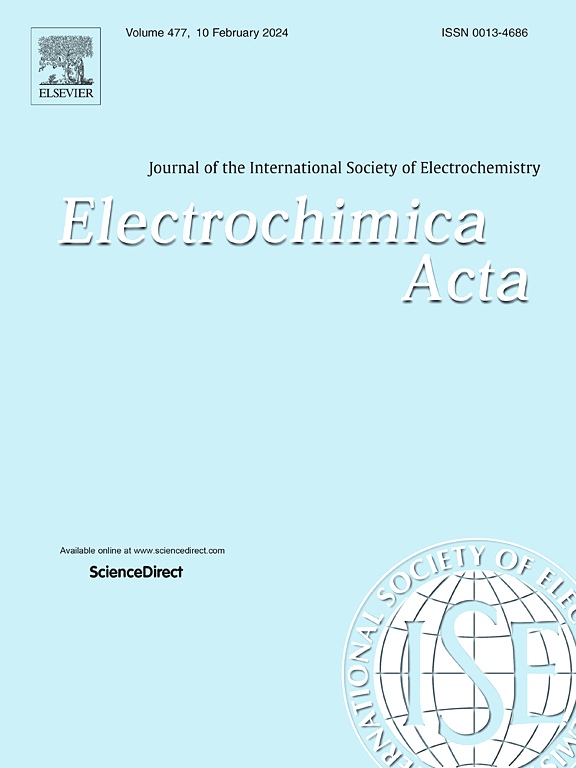醌探索:揭示用于高能量超级电容器的醌簇三维石墨烯结构的电化学性能
IF 5.6
3区 材料科学
Q1 ELECTROCHEMISTRY
引用次数: 0
摘要
在追求储能技术进步的过程中,用于超级电容器的新型电极材料,特别是有机材料的探索已引起了广泛关注。这项研究深入探讨了醌锚定三维(3D)石墨烯(3DG)架构作为高能超级电容器潜在电极材料的电化学性能、重点是阐明不同类型醌的影响,包括 1,4-萘醌(NQ)、蒽醌(AQ)、杜拉醌(DQ)、对苯醌(BQ)、2,5-二甲基-1,4-苯醌(DMBQ)和蒽醌-2-磺酸钠(SAQS)。为此,在绿色还原剂 L-抗坏血酸存在下,通过化学还原诱导自组装技术合成了各种醌锚定三维石墨烯(Q_3DG)结构。物理化学特征证实,醌类化合物成功地加入到碳结构中,且不含任何杂质。在合成过程中,氧化石墨烯(GO)和醌分子之间的不同相互作用机制导致了不同的表面形态,从而影响了它们的电化学行为。在 1.0 M Na2SO4 电解液中进行的三电极电化学特性分析表明,所有 Q_3DG 结构的电化学性能均优于 GO 以及不含醌分子的 Bare_3DG 样品。在 10 mV.s-1 的条件下,锚定 NQ 的 3DG(NQ_3DG)网络产生的比电容值最高,达到 386.3 F.g-1,几乎是 Bare_3DG 的 50 倍。这些发现不仅揭示了这些独特结构中电荷存储和转移的基本机制,而且为合理、绿色地设计具有更强储能能力的下一代有机电极超级电容器提供了宝贵的见解。本文章由计算机程序翻译,如有差异,请以英文原文为准。
Quinone Quest: Unraveling electrochemical performance in quinone-anchored 3D graphene architectures for high-energy supercapacitors
In the pursuit of advancing energy storage technologies, the exploration of novel electrode materials for supercapacitors, specifically organic materials, has garnered significant attention. This work delves into the electrochemical performance of quinone-anchored three-dimensional (3D) graphene (3DG) architectures as potential electrode materials for high-energy supercapacitors, focusing on elucidating the influence of different quinone types including 1,4-naphthoquinone (NQ), anthraquinone (AQ), duraquinone (DQ), p-benzoquinone (BQ), 2,5-dimethyl-1,4-benzoquinone (DMBQ), and sodium anthraquinone-2-sulfonate (SAQS). To that end, various quinone-anchored three-dimensional graphene (Q_3DG) architectures were synthesized via a chemical reduction-induced self-assembly technique in the presence of l-ascorbic acid, a green reducing agent. The physicochemical characterizations confirmed the successful incorporation of quinones to the carbon structure, without the presence of any impurities. Different interaction mechanisms between graphene oxide (GO) and quinone molecules during the synthesis led to different surface morphologies, which affected their electrochemical behavior. The 3-electrode electrochemical characterizations in 1.0 M Na2SO4 electrolyte revealed that all Q_3DG structures exhibited superior electrochemical performance compared to GO, as well as to a Bare_3DG sample synthesized without quinone molecules. NQ anchored 3DG (NQ_3DG) network yielded the highest specific capacitance value of 386.3 F.g−1 at 10 mV.s−1, which was almost 50 times larger than that of Bare_3DG. The findings not only shed light on the fundamental mechanisms governing charge storage and transfer within these unique architectures but also provide valuable insights for the rational and green design of next-generation organic electrode-based supercapacitors with enhanced energy storage capabilities.
求助全文
通过发布文献求助,成功后即可免费获取论文全文。
去求助
来源期刊

Electrochimica Acta
工程技术-电化学
CiteScore
11.30
自引率
6.10%
发文量
1634
审稿时长
41 days
期刊介绍:
Electrochimica Acta is an international journal. It is intended for the publication of both original work and reviews in the field of electrochemistry. Electrochemistry should be interpreted to mean any of the research fields covered by the Divisions of the International Society of Electrochemistry listed below, as well as emerging scientific domains covered by ISE New Topics Committee.
 求助内容:
求助内容: 应助结果提醒方式:
应助结果提醒方式:


